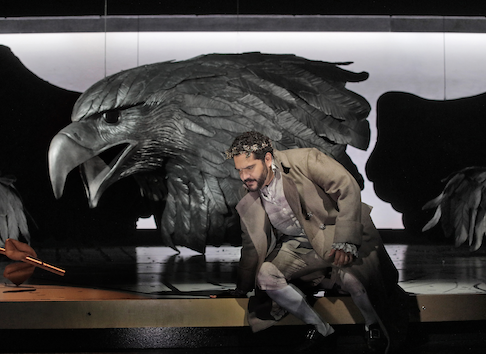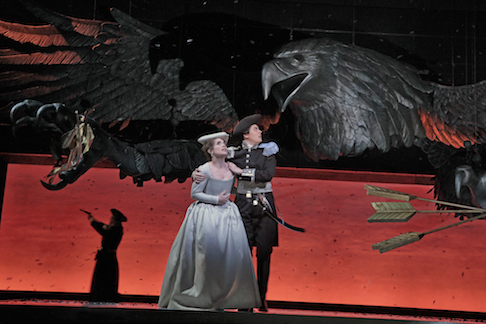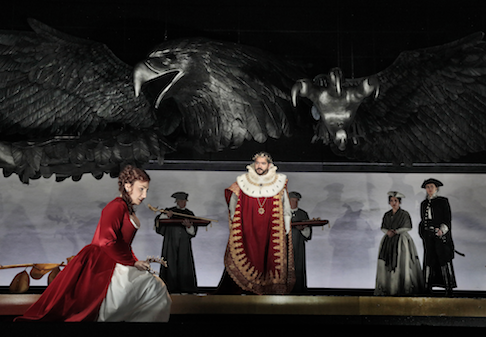![(L to R) Cecelia Hall and Laura Wilde [Photo by Ken Howard]](http://www.operatoday.com/TITUS_0288a.png)
27 Jun 2017
Titus Lightens Up in Saint Louis
Mozart’s opera seria, La Clemenza di Tito, performed in English at Opera Theatre of Saint Louis did something I did not think possible.
English Touring Opera are delighted to announce a season of lyric monodramas to tour nationally from October to December. The season features music for solo singer and piano by Argento, Britten, Tippett and Shostakovich with a bold and inventive approach to making opera during social distancing.
This tenth of ten Live from London concerts was in fact a recorded live performance from California. It was no less enjoyable for that, and it was also uplifting to learn that this wasn’t in fact the ‘last’ LfL event that we will be able to enjoy, courtesy of VOCES8 and their fellow vocal ensembles (more below …).
Ever since Wigmore Hall announced their superb series of autumn concerts, all streamed live and available free of charge, I’d been looking forward to this song recital by Ian Bostridge and Imogen Cooper.
Although Stile Antico’s programme article for their Live from London recital introduced their selection from the many treasures of the English Renaissance in the context of the theological debates and upheavals of the Tudor and Elizabethan years, their performance was more evocative of private chamber music than of public liturgy.
Evidently, face masks don’t stifle appreciative “Bravo!”s. And, reducing audience numbers doesn’t lower the volume of such acclamations. For, the audience at Wigmore Hall gave soprano Elizabeth Llewellyn and pianist Simon Lepper a greatly deserved warm reception and hearty response following this lunchtime recital of late-Romantic song.
For this week’s Live from London vocal recital we moved from the home of VOCES8, St Anne and St Agnes in the City of London, to Kings Place, where The Sixteen - who have been associate artists at the venue for some time - presented a programme of music and words bound together by the theme of ‘reflection’.
'Such is your divine Disposation that both you excellently understand, and royally entertaine the Exercise of Musicke.’
‘And there was war in heaven: Michael and his angels fought against the dragon; and the dragon fought and his angels, And prevailed not; neither was their place found any more in heaven … that old serpent … Satan, which deceiveth the whole world: he was cast out into the earth, and his angels were cast out with him.’
There was never any doubt that the fifth of the twelve Met Stars Live in Concert broadcasts was going to be a palpably intense and vivid event, as well as a musically stunning and theatrically enervating experience.
‘Love’ was the theme for this Live from London performance by Apollo5. Given the complexity and diversity of that human emotion, and Apollo5’s reputation for versatility and diverse repertoire, ranging from Renaissance choral music to jazz, from contemporary classical works to popular song, it was no surprise that their programme spanned 500 years and several musical styles.
The Academy of St Martin in the Fields have titled their autumn series of eight concerts - which are taking place at 5pm and 7.30pm on two Saturdays each month at their home venue in Trafalgar Square, and being filmed for streaming the following Thursday - ‘re:connect’.
The London Symphony Orchestra opened their Autumn 2020 season with a homage to Oliver Knussen, who died at the age of 66 in July 2018. The programme traced a national musical lineage through the twentieth century, from Britten to Knussen, on to Mark-Anthony Turnage, and entwining the LSO and Rattle too.
With the Live from London digital vocal festival entering the second half of the series, the festival’s host, VOCES8, returned to their home at St Annes and St Agnes in the City of London to present a sequence of ‘Choral Dances’ - vocal music inspired by dance, embracing diverse genres from the Renaissance madrigal to swing jazz.
Just a few unison string wriggles from the opening of Mozart’s overture to Le nozze di Figaro are enough to make any opera-lover perch on the edge of their seat, in excited anticipation of the drama in music to come, so there could be no other curtain-raiser for this Gala Concert at the Royal Opera House, the latest instalment from ‘their House’ to ‘our houses’.
"Before the ending of the day, creator of all things, we pray that, with your accustomed mercy, you may watch over us."
The doors at The Metropolitan Opera will not open to live audiences until 2021 at the earliest, and the likelihood of normal operatic life resuming in cities around the world looks but a distant dream at present. But, while we may not be invited from our homes into the opera house for some time yet, with its free daily screenings of past productions and its pay-per-view Met Stars Live in Concert series, the Met continues to bring opera into our homes.
Music-making at this year’s Grange Festival Opera may have fallen silent in June and July, but the country house and extensive grounds of The Grange provided an ideal setting for a weekend of twelve specially conceived ‘promenade’ performances encompassing music and dance.
There’s a “slide of harmony” and “all the bones leave your body at that moment and you collapse to the floor, it’s so extraordinary.”
“Music for a while, shall all your cares beguile.”
The hum of bees rising from myriad scented blooms; gentle strains of birdsong; the cheerful chatter of picnickers beside a still lake; decorous thwacks of leather on willow; song and music floating through the warm evening air.
![(L to R) Cecelia Hall and Laura Wilde [Photo by Ken Howard]](http://www.operatoday.com/TITUS_0288a.png)
Mozart’s opera seria, La Clemenza di Tito, performed in English at Opera Theatre of Saint Louis did something I did not think possible.
It made me laugh (and in a “good way”).
Productions of this least performed of Mozart’s mature operas usually are stiffly formal, with somber recitatives serving mostly as a respite from one extended aria after another, often posing as more a costumed concert than a viable dramma per musica.
Director Stephen Lawless and a witty translation by Daniel Dooner may have changed all that forever. Political intrigue still looms large in the telling of the story (how could it not?), but the plot twists hinge on a sex-kittenish Vitellia leading Sesto around by his . . .da capo aria. Have you ever laughed out loud as this villainess vamps the conflicted patrician? Has anyone? We did!
 René Barbera
René Barbera
This does not mean to suggest that Mr. Lawless has encouraged gratuitous schtick. No, rather he has rooted the character relationships in truthful interaction, underscoring the naughty, lethal game being played out by a vengeful, power hungry daughter of the deposed emperor. He also understands that there is much about the piece that is uncompromisingly dramatic, infused with profound human emotions. He trusts that those moments will take care of themselves and be even better for some light-footed balance. His effective use of the playing space included having the chorus positioned in the house aisles for the more formal court scenes.
The director has been gifted with a cast that is nigh unto perfection. As Vitellia, Laura Wild seems well on her way to becoming the Mozart soprano of choice. Her creamy, evenly produced tone had outstanding presence in every register and she colored it beautifully to reflect her changing moods, starting out teasing and urging, and ending up repentant and confessorial. Ms. Wild is also highly adept at executing the florid writing and ornamentations, suggesting a woodwind-like quality that illuminated every extended melisma. Her dramatic gifts equal her splendid instrument, most especially her deft, subtle comic timing.
The title role can often be eclipsed by the musical machinations swirling around him, but not so here. René Barbera returned to OTSL, having scored early career successes here in comic roles in The Daughter of the Regiment and The Elixir of Love. Happily, Mr. Barbera found just as congenial a fit with the clement, benevolent emperor, his gleaming tenor ringing out with alluring, stylish aplomb. His is one of the most easily produced, engagingly warm male voices currently before the public, and his ingratiating charisma makes his every performance a joy.
 Monica Dewey and Emily D’Angelo
Monica Dewey and Emily D’Angelo
Whereas many practitioners of this role limit themselves to projecting the high-handed nobility of the emperor, René also incorporates all of the conflicted humanity, the deep hurt of his betrayal, and a convincing personal debate of whether or not to execute his beloved friend. You simply won’t see a more persuasive, well-rounded performance of the titular hero than that by René Barbera.
The two trouser roles were uncommonly well cast. Sesto has much of the opera’s very best material, and Cecelia Hall was more than up to the task. Her pliant, plangent mezzo created a convincing case for a lovesick, gullible youth, blind to the fast that he is being manipulated not only to betray his best friend, but also to commit a heinous crime. Ms. Hall made Parto, parto into a finely detailed musical journey as she mused and debated her inevitable course of action.
Emily d’Angelo was a potent match with her assured traversal of Annio. Her vibrant, focused tone was flexible and expressive, but also had a nice hint of metal in it that convinced us Annio was a headstrong foil for Sesto. Ms. D’Angelo’s demonstrative reading of her dramatically florid aria won one of the show’s biggest ovations. Icing on the cake: Both ladies-as-boys were lanky and trim, and were utterly convincing as two juvenile men.
 (L to R) Laura Wilde, René Barbera, Monica Dewey, and Emily D’Angelo
(L to R) Laura Wilde, René Barbera, Monica Dewey, and Emily D’Angelo
Rounding out the soloists, Monica Dewey was a jewel of a Servilia. Ms. Dewey doesn’t have as much stage time, but her gleaming, poised soprano and delightful stage manner immeasurably enhanced every scene she was in. As Publio, Matthew Stump’s solid bass-baritone and imposing stature provided a welcome balance.
Leslie Travers has provided a handsome set design that suggests ancient Rome, counter-balanced with a luxurious costume design that is more rooted in the time of the opera's composition. The rather severe formal attire for the chorus and most principals was rather severe, with black and white waistcoats, capes and tri-corn hats for the men (of both sexes) and chorus, and formal gowns for Servilia. Titus and Vitellia were afforded luxurious, red raiment, although Titus' costumes straddled both color palettes.
The environment includes a huge rectangular platform, subtly painted with a Roman street map, presided over by an immense suspended eagle sculpture suggestive of the Roman SPQR standard, with olive branch and arrows in its respective talons. This eagle de-constructs remarkably as the city is consumed by fire, and crumbles to the floor in four separate pieces as black “ash” confetti falls from the flies. Adding to the dramatic effect was Christopher Akerlind’s masterful lighting design.
Last but most certainly not least, this performance of Titus marked Stephen Lord’s last appearance on the podium as longtime Music Director. Maestro Lord has given us a lot to be grateful for over his tenure, but none more so that this lovingly rendered, stylistically correct, and dramatically propulsive reading of a Mozartean gem. His rapport with the singers and instrumentalists alike was remarkable and his inspired leadership was of the highest order. Bravo, Maestro, e buona fortuna!
James Sohre
Cast and production information:
Vitellia: Laura Wild; Sesto: Cecelia Hall; Annio: Emily d’Angelo; Publio: Matthew Stump; Tito: René Barbera; Servilia: Monica Dewey; Conductor: Stephen Lord; Director: Stephen Lawless; Set and Costume Design: Leslie Travers; Lighting Design: Christopher Akerlind; Wig and Make-up Design: Tom Watson; Choreographer: Seán Curran; Chorus Master: Cary John Franklin